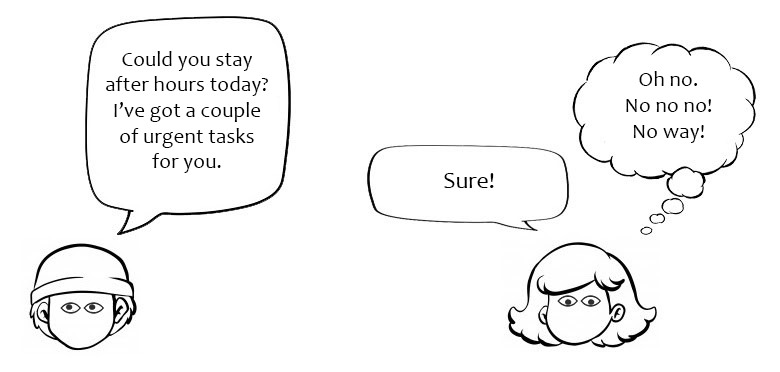How to Stop Being a People-Pleaser?
We all want to feel accepted by others. That’s in our nature to need it. Unfortunately, when we lack this sense of acceptance very badly, we use various methods, not always constructive, to get it from other people. One of such ways is constant people-pleasing. Where does this internal coercion to please others come from? And how can we break free from it?

In my work, I meet a lot of people who are exhausted by that strong internal coercion to make other people happy. They will do whatever is asked of them, even if they don't want to do it. They never know how to set boundaries and say no. They will act in the most compliant and submissive way so that everyone around them feels good. They always put the needs of others before their own just as if there was no room in their lives for themselves.
Just to be clear, I am not referring here to natural kindness, or an inner urge when we honestly want to help or support someone. That kind of attitude proves emotional maturity and if you can see a lot of such behavior in your relationships, let me congratulate you on this.
In this article, I refer to all behaviors that result from our emotional deficiencies and aim at gaining constant approval and outer validation through "people-pleasing". Read on to find out how you can break free from this destructive urge to please others.
How do we make everyone around us happy?
People who are committed to making others happy try many different ways to achieve their goals. When reading about the most common ones enumerated below, think about which of these behaviors you find familiar:
- You just can't say ‘no’, even when you really want to refuse someone (for example: you agree to stay after hours doing work that is outside your job responsibilities),

- You pretend to agree with everyone (for example: when you talk to friends you don’t express your honest opinion because you don't want to be the only person in the group who has a different one),
- You apologize to others and give excuses far too often
- You feel overcommitted and overloaded with things that you have to do for others (some of which weren’t even your initiative),
- You feel responsible for how people feel (example: when someone is down, you are constantly wondering what you might have done wrong, assuming that it is all probably your fault),
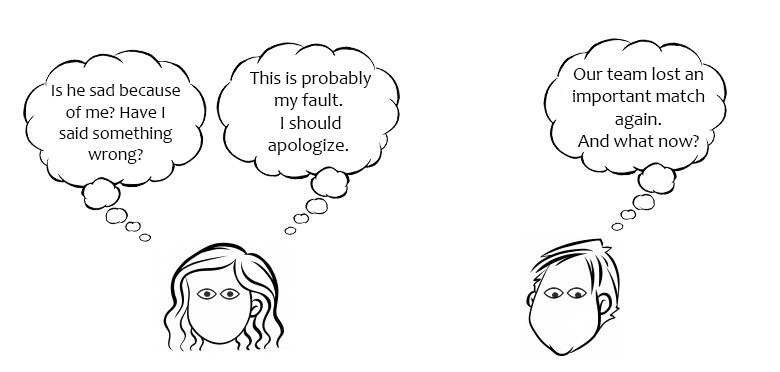
- You feel very uncomfortable when someone is angry at you (and you will do whatever you can to change their emotional state),
- You find yourself behaving like the people you spend time with (for example: you don't like drinking, but since all your friends drink, you act as if you enjoyed it),
- You need constant approval to feel good about yourself (for example: if someone doesn’t pat you on the back, you start to wonder what you have done wrong),
- You won't say that someone hurt your feelings when it happens (because you don't want to be a problem for them),
- You will do whatever you can to avoid conflict (even if it means denying your needs).
The first step to free yourself from this habit is to realize two things. Firstly, you need to know the mental and emotional consequences of continuing to please people. Awareness will give you the motivation to make a decision to free yourself from people-pleasing.
Secondly, you need to understand why you need to please people. Once you know the reasons for such behavior, you will get a clue how to deal with it.
Pleasing everyone except yourself
Let's start with the internal as well as external consequences of constantly trying to please others:
- You deplete your energy resources. People-pleasing devours a lot of your time and vital energy. Just think about how much energy you devote to thinking about what others think or planning activities that are supposed to make them happy.
- You fall out of touch with yourself. As a result of all the things mentioned above, you have very little time, energy or space to think about your own needs. They no longer matter to you anyway, so at some stage you simply stop being aware of them. And when they come to the surface, you will do everything to suppress them, because they disturb you in the mission of pleasing everyone around you but you.
- You lose self-respect. You treat yourself as the least important person in the world. Your needs come always last. You neglect them because otherwise, you would have a constant internal conflict that would devour even more of your energy. In addition, somewhere deep in your heart you may be aware that people may like you not for who you are but for what you do for them.
- Nobody knows the real you. Since you constantly put on masks to hide your emotions and needs (so not to make anyone feel uncomfortable), you don't give anyone a chance to see this authentic version of you.
- Your social life doesn’t give you any joy or pleasure anymore. Why is it so? Because when you meet with your friends, you don’t let yourself just be and enjoy the time spent together. As you lack self-acceptance, your main goal is to fill this hole inside you by doing everything you can to make others like you. To this end, you need to constantly think about how they feel and what they think about you, therefore, you are in no place to have the simple pleasure of being.
- You suppress your emotions. You hide from others everything that might make them feel uncomfortable. You can't even imagine being a problem for someone, that's why you squash such feelings as anger, frustration, sadness, regret or tension. You will do everything to be cool and pleasant to others. As a result, more and more unexpressed emotions pile up inside you...
- You become resentful. Frustration that has not been expressed will seek an outlet, usually in the form of passive-aggressive behaviors, i.e. unconscious and hidden attempts to vent and get it out of your system. It can manifest itself in everyday life by sarcastic or biting comments. Such behaviors are detrimental to our relationships because they hinder the development of intimacy between you and your partner.
- You will become less committed to being there for other people. When your needs remain unfulfilled, you'll naturally grow reluctant to please others or be in any way helpful to them. Of course, you will still do it, because the desire to be liked prevails. However, the parts of you that need to let go, relax, be taken care of, etc. will not remain silent as they are responsible for your basic needs being met. An internal struggle will drain you of strength, while your commitment and willingness to help others will decrease (which does not mean that you will give up pleasing people).
- People will take advantage of you, mostly because it’s convenient for them and they are often unaware of the costs on your side. How would they know anyway when you respond to their requests with a broad smile and a cheerful ‘yes’? By not setting clear boundaries, having low self-esteem and a very strong urge to please others you become an ideal object to milk and drain life energy out. Even when you know that you are being used by someone, the high you get from being needed and wanted, which comes with pleasing others, is like a glass of water in the middle of a desert for you - something you would never ever give up on.
If you experience at least some of the consequences of people-pleasing described above, it has certainly not been pleasant for you to acknowledge that. It’s good to remember that there can be no change without discomfort. You need to embrace this feeling of discomfort to find the motivation to let go of the old pattern of behavior and build a new healthier one.
Therefore, now we will go a step further and look into it even deeper. Where does this strong urge to please others come from?
The answer is in our past, as always
When we talk about self-esteem, it is crucial to take a closer look at our childhood. This is the time when our sense of identity is shaped. It depends a lot on our relationships with our parents whether, as adults, we will seek acceptance and approval outside, or maybe we will feel good about ourselves the way we are.
The source of this desire to please others, especially in the areas where it seems the strongest, is often associated with being mistreated by parents as a child. Children who experience physical or psychological violence often come to the conclusion that satisfying their abusers makes them hurt them less. Repeated attempts to mitigate the inevitable punishment (sometimes this process takes months or even years) become a child’s habit and an inseparable part of their personality. Such a child will automatically and unknowingly want to please people in their adult life, in order to protect oneself against somebody else’s anger or criticism.
Another source of strong tendency to please people might be the parents’ conditional love. Some parents show love and affection to their child only when it is polite and behaves the way parents want. When a child does something their own way, acceptance and approval are withheld, which creates a pattern in a child’s mind: I am worthy of love only when I please others. Such beliefs can become part of their attitude for life (although most people never get to realize that this is a problem).
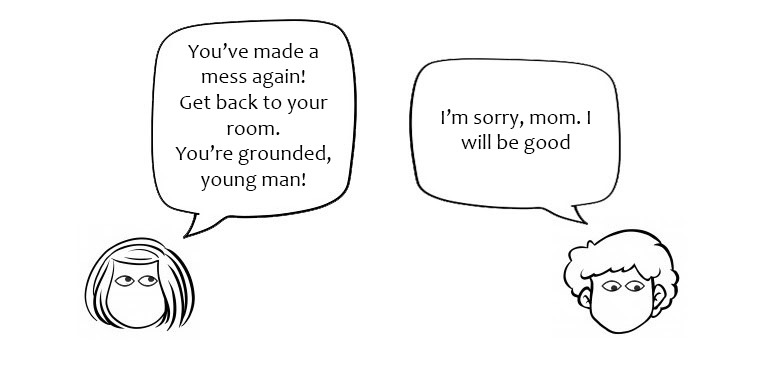
The need to please people might also come from having heard critical comments from the parent. If you were criticized even for small things as a child, you will have a fear of making mistakes in the future. You will always try to be perfect. In adult life, this tendency might manifest itself in a strong desire to make others happy.
This internal coercion doesn’t always have to result from a difficult relationship or traumatic experience. In many cases, even the most loving parents, who show their love and refrain from criticizing their children, drill them to always put others first, be polite, not to cause anybody any problems, and so on.
To sum up, people-pleasing usually is a sophisticated defense mechanism of our psyche. People-pleasers are often afraid of rejection, harsh punishment or unfair criticism. This is how they try to protect the most wounded and rejected parts of their personality. At the same time, they look for acceptance, approval and love to free themselves from that fear that something is wrong with them. For some of them, people-pleasing has become the only effective way to patch up emotional holes, while for others - the habit of being polite and low-maintenance, inherited after their parents' mentality.
The futile effort
Unfortunately, the truth is that the benefits of such actions are very short-term. If you don’t feel we’re good enough, if we carry burdens from your past, no "thank you", or smile, or any praise from the other person will heal these wounds. You will feel like a leaky bucket, which when filled with fresh water gets what it needs but only for a moment.
Why is it so?
Because by pleasing other people, you don't get what you really need. What you need most is to realize and accept on the deepest level that everything is OK with you. That you are alright the way you are. That you don't have to become someone else.
And what do you get from people-pleasing?
Sure, people will like you, but not for who you are, but for what you do for them. They like you because you help them meet their needs. You are useful to them. You don't make any fuss. You are low-maintenance.
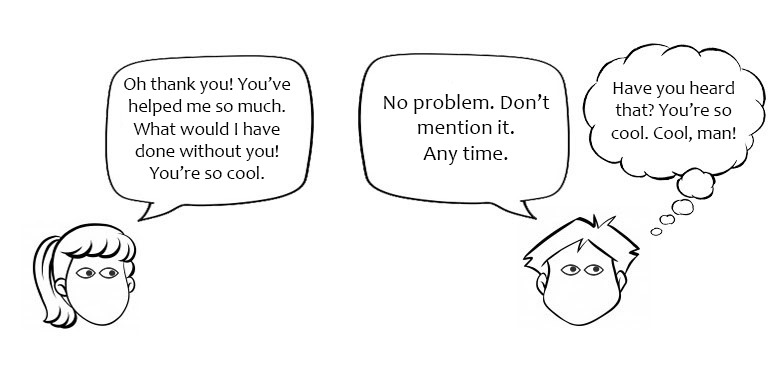
Being a people-pleaser, you don't even give others the chance to get to like you for who you are, for your values and way of being. You are too focused on being a hassle-free individual and hiding behind masks.
As a result, you get a mere substitute instead of what you are really looking for. This substitute will never be enough to feel truly accepted and loved by others. Neither will it foster your self-esteem in any way.
Think about this for a moment. Aren't you curious how people will relate to you when you show them your real face? That is when you start to say what you think and follow your heart in what you do?
I am aware of the fact that the perspective of "showing your true self" can seem terrifying at this stage. What if someone doesn't like me? What if they reject me? What if they criticize me? What if... everything I think about myself turns out to be true?
Frankly speaking, these fears will get verified by reality and some of them might actually turn out to be quite reasonable. Not everyone in the world will be taken aback on just meeting you. Not everyone will become your friends. In fact, most people will not be your cup of tea and will go their own way after a shorter or longer acquaintance.
However, you can be sure that you will also meet people so alike that they will feel great in your company. People who will like you, not for what you do for them, but for what kind of person you are. People who will like you, even if you say ‘no’ to them, even when you want to take care of yourself first, or even when you tell them exactly what you think.
What's more, people will accept you and appreciate you even when you live in harmony with yourself. They will want to be around you BECAUSE you are authentic and you don't wear masks.
Once you let go of the need to be liked by everyone, the fact that you will not make friends with everyone will no longer bother you. You will begin to understand that this is the natural course of things. By being yourself you kind of screen out people who you should get closer to and who you shouldn’t. Those who will like you for who you are are potentially good people to build long-term, honest and mutual bonds with.
And these authentic relationships will become one of the most important building blocks of your self-esteem. Nothing compares to the feeling you get when you are seen and accepted for who you really are. A single relationship, in which you feel that way, will give you more than the multitude of relationships, in which you are liked on the account that you are a low-maintenance and helpful friend. A single relationship, in which you can be fully yourself will teach you more self-love than the multitude of praises and thanks from people for whom you have once again devoted your time and energy.
Of course, I don’t mean here that you need other people to be able to accept and love yourself. The most important work you need to do is to heal these wounded parts of you (if you carry such burdens within you) and build a good, healthy relationship with yourself.
However, we need to let go of the illusion that we can lead a full life and feel complete and happy without other people. We need close relationships and there is no doubt that they can help us nurture our love for ourselves.
Pleasing... myself
At this stage, it has probably become clear to you that you used people-pleasing as a way to please yourself, that is to get the acceptance, love and approval that you craved. You have also learned that this is not the best way to achieve that goal. Not only is this a wrong strategy, but it also makes less probable that any of your relationships will truly meet your need for belonging and acceptance.
The best decision you can make now is to focus your attention on the practice of being yourself. Authenticity results from our everyday decisions, even the smallest ones. It can be a decision to tell the other person how you feel. Or a decision to kindly refuse to help someone when there is something more important that you want to do. Or a decision to devote your emotional energy and valuable time to those who you really want to - and not everyone, only so that they like you.
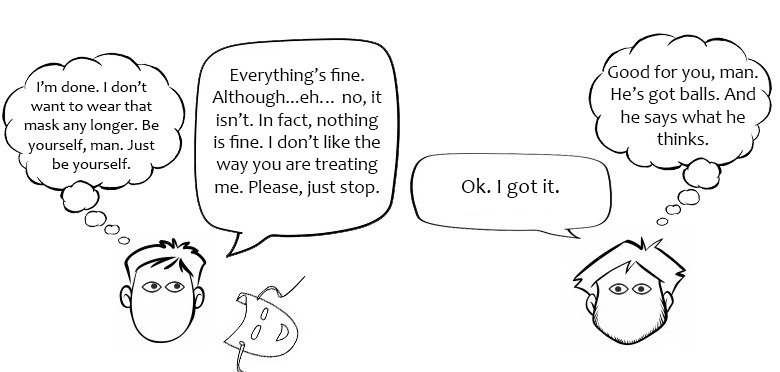
If you start to manage your energy wisely and stop trifling it away, the quality of your attention, support and help you offer others will increase rapidly. The relationships that have the potential to develop in your life will benefit a lot, and the ones which would not work out anyway... will slowly fade away.
Be prepared for the fact that if you start expressing yourself in a more honest and direct way, some people may dislike it. Those who got used to having you at their beck and call, or to your nodding to everything they said, maybe a little baffled by such a change. Some may even get upset that they can't take advantage of you anymore. Others may come to the conclusion that once you stop being all that compliant and submissive, you are no longer cool to them anymore.
Although this may be a difficult process for you, you desperately need to power through this. It will teach you to select people who you want to have a closer relationship with, and who you want to let go. Changing your attitude towards relationships will help you riddle and fling away relationships that are not important to you.
Some people may clearly show their dissatisfaction (for example by pretending they don’t get it) in order to manipulate you and thus make you to return to your “old” self (the one who was more useful to them). Of course, they will do it completely unconsciously, projecting their own emotional deficiencies. It is important that you neither succumb to these manipulations nor criticize these people for behaving this way.
Give them a chance by explaining to them the change you undergo and tell them that you see in their behavior a hidden attempt to influence you. If they respect you and value their relationship with you, they are likely to hear you out and change their attitude. It might not be easy for them, so be patient. However, if they don’t acknowledge the change in you, ask yourself whether you want such a person in your life at all.
In any case, remember to stay in harmony with yourself no matter what. The feeling of self-respect that comes from being faithful to yourself is a wonderful and very uplifting thing.
What next?
From my point of view, understanding everything I have written above is crucial for our approach to change and for us to let go of people-pleasing as a solution. In many cases, just looking at this habit from a new perspective and understanding its causes is enough to quit it. Nevertheless, it's worth working on any change at different levels, so below you will find some tips on how to foster your new habits.
First of all, I would like to point out that in some cases neither understanding the source of the problem nor using practical tips will help. When you need to please people is really strong or can be related to childhood trauma, the best thing you can do is to go see a psychotherapist. By dealing with deeply buried emotions, you will be able to regain emotional freedom and start taking care of your needs.
If you feel that you need to please people is not that obsessive, there is a good chance that you can deal with it on your own. Here's how you can work on quitting the habit of people-pleasing:
- Understand that taking care of yourself and saying no to people is NOT impolite. Considering assertiveness as being selfish is often the reason people avoid assertive responses. The truth is that you can refuse and stay nice and kind in it. You can express your needs without violating other people's boundaries. You can share your real opinion without having the fear that people will stop liking you. This is an important skill to gain and I created a course on how to say no in kindly: Assertiveness
- Start with small steps. Say no in a minor matter. Express your opinion on a secondary issue. Tell about your needs in some ordinary situation. Don’t jump in the deep end. Practice self-expression in situations that you find easy.
- Pay attention to how you feel when you say no. What emotions does it arise? Shame? Guilt? Anger at yourself? Whatever feelings you’ve got, you might want to take a closer look at them later. In this way, you will understand what you associate with assertiveness and you will be able to work on this association.
- Learn to express your feelings and needs using a language of love. Don't judge another person, just talk about what you’re experiencing. If you want to know how to do it, make yourself familiar with the basics of Nonviolent Communication
- Start working on your needs: acknowledge, observe and fulfill them. Make a list of your needs and find ways to meet them. If you need some tips here, take a look at Chapter 2 of my book "Insight" ("Human Nature"), where you will find exercises that can be of much help.
I encourage you to do a small experiment, which will allow you to check how you feel when you give up people-pleasing. A plan that you will not try to please the people around you over the next 7 days. You will give responsibility for the well-being of others into their own hands and focus only on your needs. After a week, take a moment to reflect on how you felt throughout the week.
Such a trial period doesn't require you to make big changes right away, because it's just an experiment. During this week, read this article one or two more times to get back on the right track, and put into practice the tips I gave you. I keep my fingers crossed for the results of your experiment.
Write in the comments what you’ve taken out from this article. Let me know how you feel about the new form of illustrating its content.

